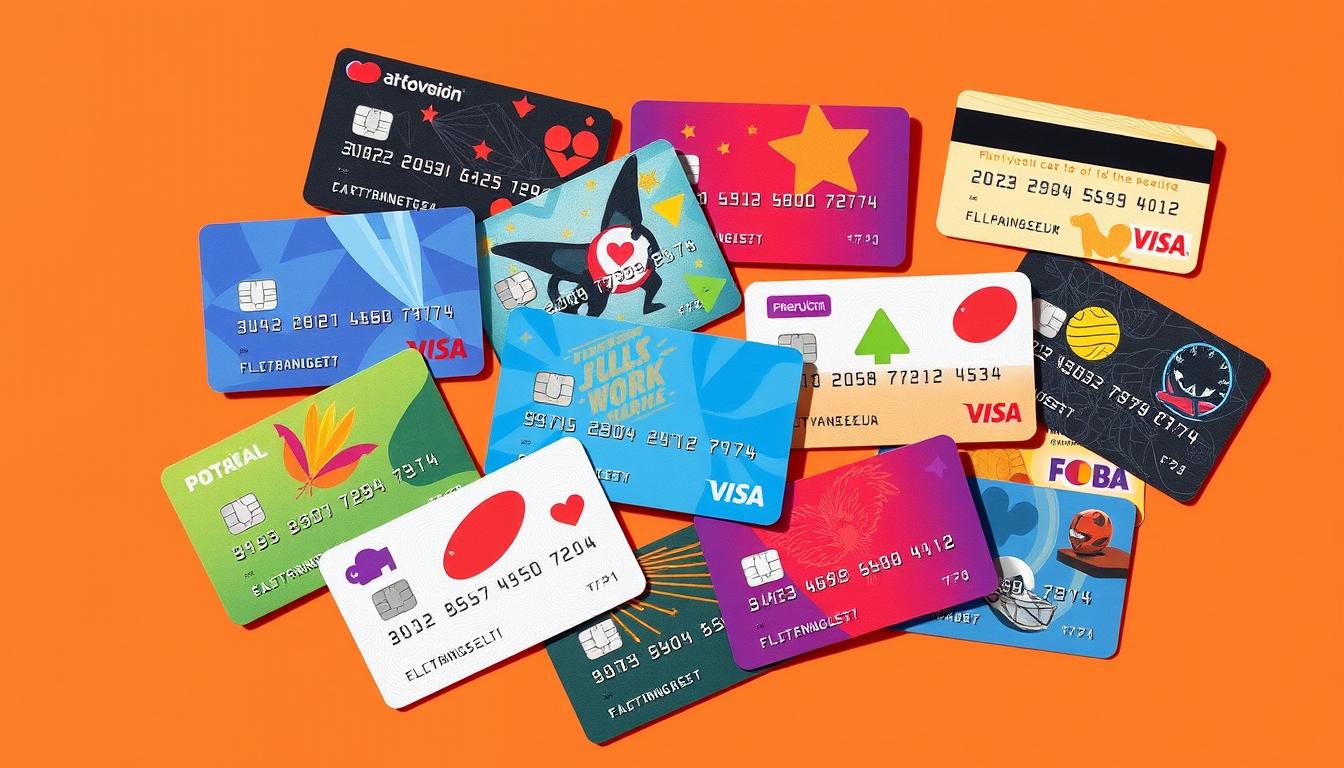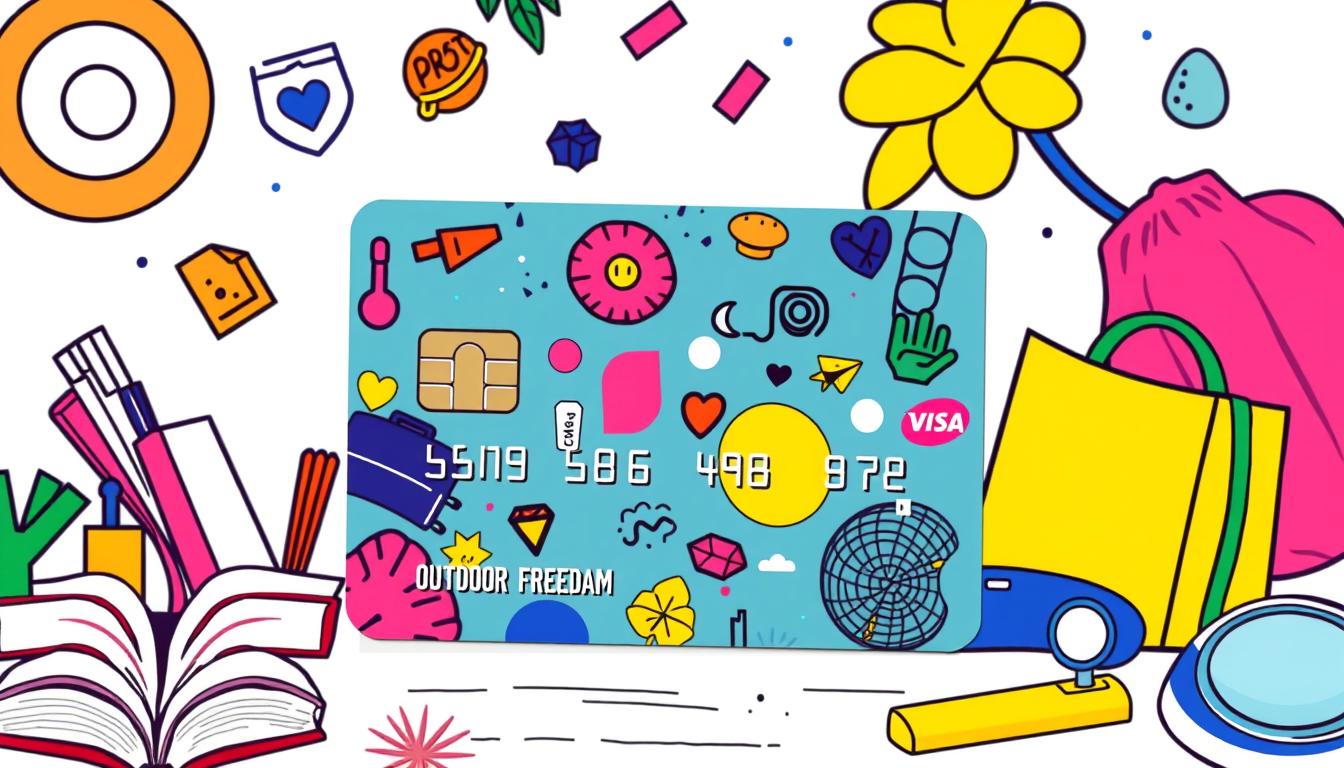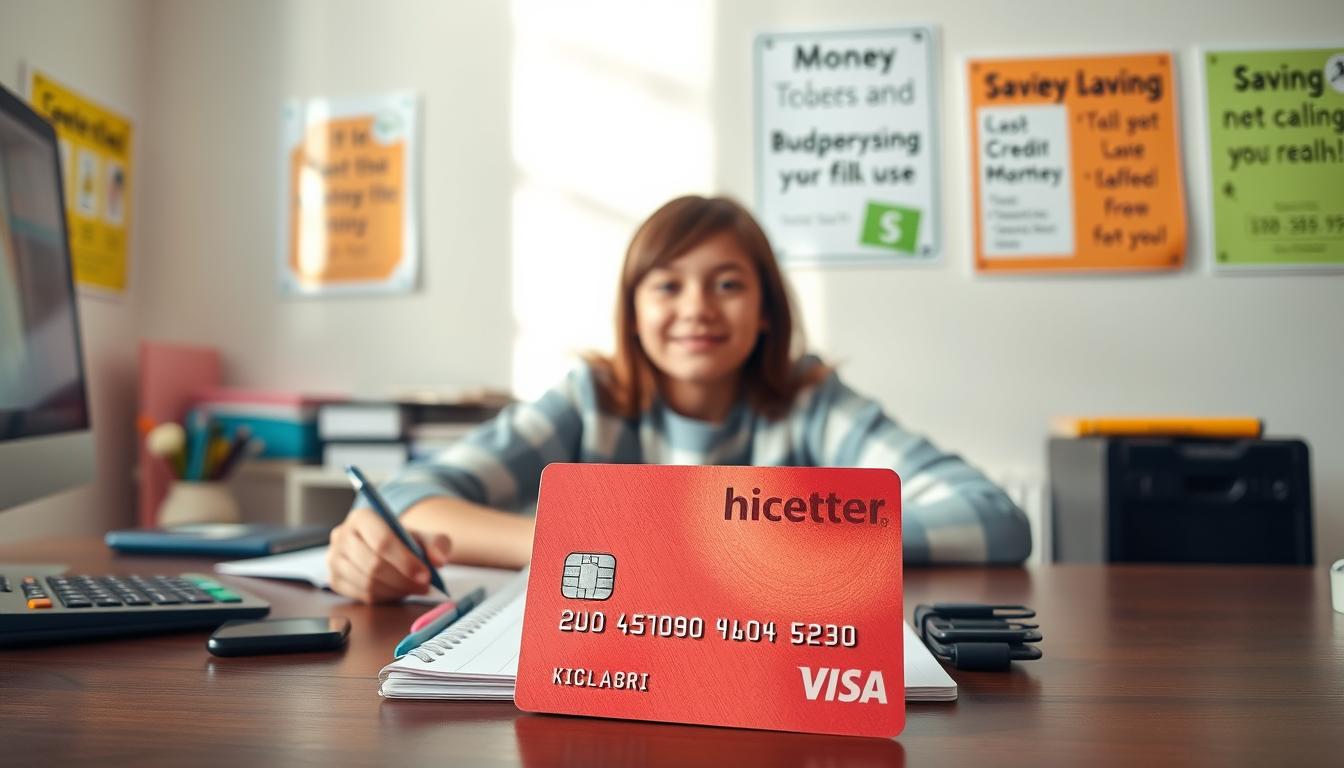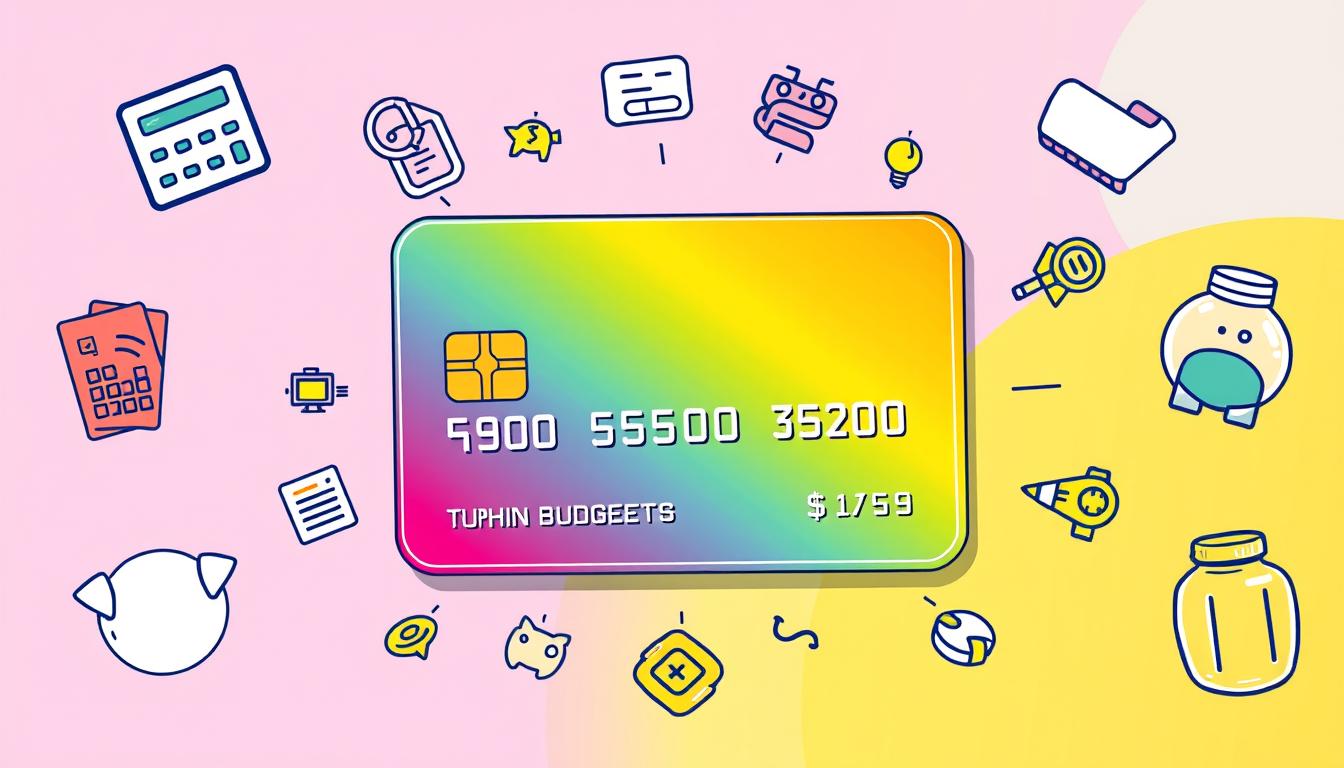Parents aim to equip their children with financial knowledge and tools. The kid credit card visa is gaining attention as a powerful tool. It empowers teenagers and helps them build credit history early.
A kid credit card visa can foster financial responsibility in children. It sets them up for long-term success. Parents can help their teens become independent with this tool.
The Walmart Credit Card is a great kid credit card visa option. It offers benefits like building credit history and learning responsible credit usage. Teens can gain practical experience in managing finances with this card.
The Walmart Credit Card empowers teens to become financially savvy. It prepares them for future financial challenges and opportunities. Parents can help their teens learn valuable money management skills.
Key Takeaways
- Kid credit card visa offers a pathway for teens to build credit history and develop financial responsibility.
- The Walmart Credit Card is a viable option for a kid credit card visa, providing a safe and controlled environment for teens to learn.
- Introducing a kid credit card visa can help teens gain practical experience in managing finances, budgeting, and making informed spending decisions.
- By starting the credit-building process early, parents can set their children up for long-term financial success and independence.
- Responsible usage of a kid credit card visa can instill valuable financial lessons and empower teens to become financially savvy individuals.
Why Consider a Credit Card for Your Teen?
A credit card can help your teen build credit history and learn responsible usage. Adding them as an authorized user establishes a credit profile early. This advantage helps when applying for loans or renting apartments later.
Credit cards teach teens important financial skills. They learn budgeting, tracking spending, and making timely payments. These skills prepare them for financial independence.
Build Credit History Early
Introducing a credit card can help your teen build credit history for teens. As an authorized user, they start establishing a credit profile. This gives them a head start for future credit applications.
Teach Responsible Credit Usage
A credit card is a valuable tool for teaching teens credit card responsibility. Teens learn budgeting, spending tracking, and timely payments. These skills are essential for long-term financial success.
Credit cards offer benefits of credit cards for minors by establishing a strong credit foundation. With guidance, this step prepares your child for financial independence. Proper oversight ensures they develop healthy financial habits.
Credit Card Options for Minors
Minors have several credit card options to consider. These include becoming an authorized user, applying for a low-limit card, and using prepaid cards. Each option helps build credit history and teaches responsible money management.
Adding as an Authorized User
Adding a child as an authorized user on a parent’s credit card is a smart choice. This helps build the minor’s credit history under adult supervision. Parents maintain control over the account, ensuring responsible use and timely payments.
Applying for a Low-Limit Card
Teens can apply for their own low-limit credit card. This option provides independence and teaches responsible credit use. The low credit limit minimizes risk while allowing minors to establish their credit history.
Using Prepaid Cards
Prepaid cards are useful for teaching money management skills to minors. These cards allow controlled spending and help develop budgeting habits. However, they don’t directly contribute to a credit report.
| Credit Card Option | Benefits | Drawbacks |
|---|---|---|
| Authorized User | – Builds credit history under adult supervision – No minimum age requirement | – Parent remains responsible for account |
| Low-Limit Card | – Builds independent credit history – Teaches responsible credit usage | – Potential for overspending |
| Prepaid Card | – Develops money management skills – No credit reporting | – Does not contribute to credit history |
These credit card options for minors help teens build credit and learn financial skills. Parents can guide their children towards a strong financial future through these options.

Minimum Age Requirements by Card Issuer
Credit card age requirements vary among issuers. Some allow teens as young as 13 to be authorized users. This can help young people build credit history early.
Discover and Capital One let minors become authorized users at 13 or 16. American Express and Citi have no minimum age for authorized users.
For primary cardholders, the age limit is usually higher. Most lenders require applicants to be 18 or 21 years old. Some need proof of income or a co-signer for younger applicants.
| Card Issuer | Minimum Age for Authorized Users | Minimum Age for Primary Cardholders |
|---|---|---|
| Discover | 13 years old | 18 years old (or 21 with proof of income) |
| Capital One | 16 years old | 18 years old (or 21 with proof of income) |
| American Express | No minimum age | 18 years old (or 21 with proof of income) |
| Citi | No minimum age | 18 years old (or 21 with proof of income) |
| Chase | None specified | 18 years old (or 21 with proof of income) |
| Bank of America | None specified | 18 years old (or 21 with proof of income) |
| Wells Fargo | None specified | 18 years old (or 21 with proof of income) |
Knowing these age rules is key when picking a credit card for your teen. It helps you choose wisely and apply smoothly.
Pros and Cons of kid credit card visa
Credit cards for teens offer both advantages and potential drawbacks. Understanding these risks is vital when considering this financial tool for your child.
Advantages of Introducing Credit Early
An advantage of credit cards for teens is the chance to build credit history early. Responsible use can create a positive credit profile, benefiting future loan applications and housing opportunities.
Credit cards can teach teenagers valuable financial skills. These include budgeting, responsible spending, and payment discipline. Such habits can serve them well into adulthood.
Potential Drawbacks to Consider
- The disadvantages of credit cards for minors include the risk of overspending. This could lead to debt and harm the teen’s credit score.
- Parents are responsible for charges made on the card. This can be worrying if the teen’s spending isn’t closely watched.
- Teens might use the card for impulse buys. This could undermine the goal of building credit responsibly.
Guidance and clear boundaries are crucial when giving a credit card to a minor. Close monitoring of card usage is also important.
Balancing the advantages of credit cards for teens with the risks of credit cards for kids is key. This approach ensures a positive financial learning experience.

Sharing Your Credit Card Account
Adding a child as an authorized user on your credit card requires careful thought. Consider fees, spending limits, and credit reporting. Choose a card that fits your child’s needs, like one with no foreign transaction fees for travelers.
The best cards for authorized users align with your child’s situation. Look for options that can track 529 plan expenses if needed.
Considerations for Selecting a Card
When picking a credit card for your kids, weigh the pros and cons. Key factors include authorized user fees, spending limits, and credit reporting.
Compare costs across different cards for adding an authorized user. Check if you can set custom limits to teach responsible usage.
Find out if the issuer reports the authorized user’s activity to credit bureaus. This can help build your child’s credit history.
- Authorized user fees: Some issuers charge a fee for adding an authorized user, so compare costs across different cards.
- Spending limits: Can you set customized limits on the authorized user’s account to help them learn responsible usage?
- Credit reporting: Does the issuer report the authorized user’s activity to credit bureaus, helping to build their credit history?
- Rewards and benefits: Consider a card with features that align with your child’s needs, such as no foreign transaction fees or the ability to track 529 plan expenses.
Pick a card with rewards and benefits that suit your child’s needs. Set clear rules to help your teen build strong financial skills.
This approach can help your child develop a solid credit foundation. It’s a valuable step towards their financial future.
Teaching Responsible Credit Usage
Teaching teens about credit cards requires a proactive approach. Open discussions about money management are crucial. Start with small purchases using their own funds, like allowance.
Set clear spending boundaries to help teens develop good financial habits. This empowers them to make smart decisions. It builds a solid foundation for future financial independence.
Budgeting and Tracking Spending
Encourage teens to create and maintain a personal budget. This includes tracking spending and sorting expenses. By monitoring their finances, teens learn to make smarter choices.
They’ll understand how their spending habits affect their finances. This knowledge is key to developing credit card responsibility.
Discussing Financial Principles
Regular talks about financial literacy for minors are vital. Parents should discuss credit history, debt management, and long-term financial impacts.
Explain credit scores and their effect on future opportunities. Talk about needs versus wants and how to prioritize spending. Encourage saving and explore the benefits of compound interest.
- Explain the concept of credit scores and how they can impact future opportunities.
- Discuss the difference between needs and wants, and how to prioritize spending accordingly.
- Encourage teens to save a portion of their income and explore the benefits of compound interest.
Creating an open, educational environment helps teens develop credit card education. This knowledge will guide them in making smart financial choices for years to come.

| Technique | Description |
|---|---|
| Budgeting and Tracking Spending | Encourage teens to create and maintain a personal budget, track their spending, and categorize expenses to develop a deeper understanding of their financial habits. |
| Discussing Financial Principles | Engage teens in conversations about credit scores, the difference between needs and wants, the importance of saving, and the long-term implications of financial decisions. |
| Gradual Responsibility | Start with small or occasional purchases, allowing teens to use their own funds (e.g., allowance) to make purchases and build financial responsibility. |
kid credit card visa: An Overview
The kid credit card visa empowers teens and sets them up for financial success. It offers a safe way for minors to access credit under supervision. Parents can help their children build credit history and learn money management skills.
The kid credit card visa has several key advantages. It helps build teen’s financial skills through hands-on experience. It allows credit history to be established early, benefiting long-term financial standing.
This card provides a controlled environment for learning responsible credit usage. Parents can equip their teens with tools for navigating the financial landscape confidently. This sets the stage for prudent money management and financial independence.
- Helps build teen’s financial skills through hands-on experience managing a credit account
- Allows credit history to be established at an early age, which can benefit the teen’s long-term financial standing
- Provides a controlled environment for learning responsible credit usage under parental supervision
| Feature | Benefit |
|---|---|
| Builds Credit History | Establishes a credit profile early, which can positively impact the teen’s future borrowing power and credit score |
| Teaches Responsible Usage | Provides a controlled environment for learning how to manage credit responsibly, including budgeting, payment, and credit utilization |
| Enhances Money Management Skills | Enables teens to develop critical financial skills like tracking spending, setting budgets, and making informed purchasing decisions |
The kid credit card visa is an effective tool for building teen’s financial skills. It can set them up for long-term financial success. With guidance, this card empowers teens to take charge of their financial futures.
Setting Boundaries and Budgets
Establishing clear boundaries and budgets is vital for teen credit card use. Parents can limit credit lines and monitor spending closely. Encouraging teens to use their own money for purchases helps build financial responsibility.
Tracking account activity ensures responsible usage. Parents can address any issues quickly by staying vigilant.
Tracking Spending and Activity
Regularly reviewing teen credit card statements is crucial for budgeting tips for minors with credit cards. This helps identify unusual spending patterns or potential misuse.
Prompt action can address any concerns. Frequent talks about responsible spending help teens develop healthy financial skills.
| Recommendation | Benefit |
|---|---|
| Setting credit card limits for teens | Establishes clear boundaries and prevents overspending |
| Monitoring teen credit card usage | Allows for early detection and resolution of any issues |
| Encouraging the use of personal funds | Teaches responsible financial management and budgeting skills |
These strategies help teens develop healthy financial habits and use credit cards responsibly. This approach safeguards teens’ financial well-being.
It also builds a strong foundation for lifelong money management skills.

Protecting Against Fraud and Misuse
Parents must address protecting teens from credit card fraud and unauthorized use. Minors are vulnerable to this issue. It’s crucial to teach them how to safeguard their personal and financial information.
Teach teens not to share card details in public or online. Many kid-focused credit cards offer robust fraud protection features. Parents can monitor account activity and freeze the card if needed.
| Strategies to Protect Teens from Credit Card Fraud | Benefits |
|---|---|
| Educate on safeguarding personal information | Reduces the risk of sensitive data being compromised |
| Utilize parental controls and monitoring features | Enables parents to track spending and detect any suspicious activity |
| Promptly freeze the card in case of unauthorized use | Minimizes the potential financial impact and protects the teen’s credit |
Proactive steps can empower teens to develop responsible financial habits. The right strategies make a kid credit card visa a valuable tool. It can help build credit history and financial literacy safely.
Conclusion
A kid credit card visa can transform a teenager’s financial journey. It introduces credit under supervision, teaching valuable money management skills. The benefits include building credit, earning rewards, and having a secure payment method.
Financial education for minors is crucial. A kid credit card visa helps build financial skills and teaches responsible credit use. It lays the groundwork for future financial well-being.
Parents can empower their children by setting boundaries and tracking spending. This helps teens make informed decisions and develop lifelong financial literacy.
The summary of benefits of credit cards for teens shows it’s a worthwhile investment. With proper guidance, teenagers can navigate modern finances and achieve future financial success.
FAQ
Can I apply for a Walmart credit card online?
How do I apply for a Walmart credit card?
How do I apply for a Walmart credit card online?
Where can I apply for a Walmart credit card?
How do I apply for a Walmart credit card at Walmart?
Source Links
- Credit Cards for Kids and Teens – https://www.kiplinger.com/personal-finance/credit-cards/credit-cards-for-kids-and-teens
- Best Debit Cards For Kids And Teens Of September 2024 – https://www.forbes.com/advisor/banking/best-debit-cards-kids-teens/
- Credit Cards for Teens: What to Consider | Chase – https://www.chase.com/personal/credit-cards/education/basics/children-credit-cards

